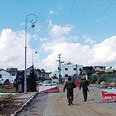
Ghajar residents irate over possible IDF pullout
Residents of divided village outraged over Jerusalem's decision to launch talks on ceding control of its northern section to UNIFIL. 'We will not accept any decision that will separate families and violate our rights,' council secretary says
Residents of Ghajar were outraged over Prime Minister Ehud Olmert's decision to launch negotiations with the UN on a possible Israeli pullout from the northern half of the village, which is currently divided between Israel and Lebanon, and ceding control to UNIFIL forces.
A perimeter fence was built along the northern edge of the village in Lebanese territory, up to 800 meters north of the of the internationally demarcated border between Israel and Lebanon.
The government's decision to launch talks with the UN was reached Wednesday following a Prime Minister's Office security briefing on the matter, which was called after the UN offered to station monitors in the village. Israel has expressed concerns that Hizbullah operatives may use the divided village in order to cross into Israel.
"We've been living in a prison for eight years; the village is surrounded by large IDF and Border Guard forces," Ghajar Local Council Secretary Najib Hatib told Ynet. "All of the residents hold Israeli identification cards, but live between fences that were erected by the IDF and the UN to prevent arms smuggling and the infiltration of terrorists into Israeli territory.
"About two-thirds of the 12,000 residents live in the village's northern section – the part PM Olmert wants to return to Lebanon," he said. "We will not accept any decision that will separate families and violate our rights. We will protect our land, which was cultivated by our parents and grandparents and then passed on to us."
Some of Ghajar's residents also retain Syrian citizenship, which was given to them when the village was part of the Quneitra Governorate. Residents are adamant about seeing their village returned to Syria along with the rest of the Golan Heights as part of a future peace agreement between Israel and Syria, and the implementation of UN Resolution 242.










